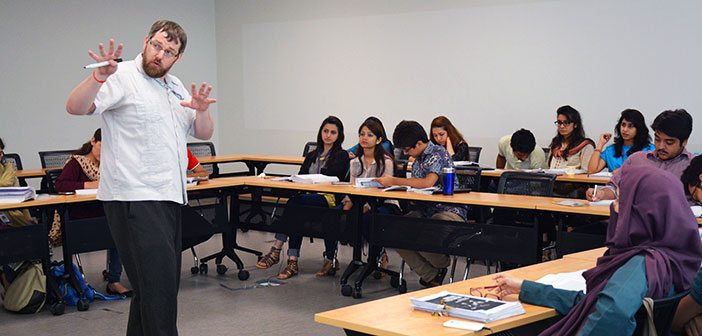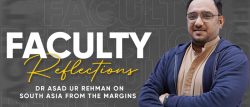The interdisciplinary nature of a Liberal Arts education is such that has built many success stories around it. At Habib University, faculty members along with academic staff ensure this nature is reflected in everything they do, from learning, to teaching, to extra-curricular activities and even personal hobbies. One such example of a pure Liberal Arts academic experience is Dr. Aaron Mulvany, Assistant Professor at the School of Arts, Humanities and Social Sciences and the Director of Academic Performance and Summer Programs. Bringing with him invaluable learning experiences from the University of Pennsylvania, he has been a part of the education industry for more than a decade, teaching at every level, from primary school to university. One of his foremost achievements during his career has been the development of an interdisciplinary arts and culture program for primary and lower secondary schools in Philadelphia.
The path that got me here is unconventional, when I was in my undergraduate I was studying music and European history. I knew it would be difficult to build a career out of music so I chose to go with European History in order to have something that would get me a job, later on in my career. But I knew it was music that was my passion, and I honed that through my post-graduate degrees. What fascinated me about music were its anthropological aspects, its social aspects.
Building his career on a list of varied interests including folklore, anthropology and history, Dr. Mulvany has had a rich and unconventional academic experience, one that has led him to Habib University. Currently teaching two classes, “The Ethics and Methods of Research”, and “Kabhi Pani Kabhi Pyas”, he has just begun teaching his third year at Habib University, having been a part of the institution since its inception.
In his class “Kabhi Pani Kabhi Pyass” under the Social Development and Policy program, students learn about the significance of water in our lives, drawing from social history, anthropology, and environmental crises wrought by global climate change. Dr. Mulvany’s academic course has led him to delve into this subject especially in the context of the subcontinent, his research having appeared in international publications and journals. This particular subject is a culmination of his global academic research, and offers students a chance to explore the subject of natural sciences in order to delve into the problem of water-scarcity in this region of the world. He also probes the socio-cultural significance of water around the world in his class, sharing with his students the implications of the water crisis in relation to climate change as well as stories from around the world of improvised solutions, scientific and systematic methods and the change in migratory flows due to such global issues.
Dr. Mulvany also teaches “Ethics and Methods of Research” under the Social Development and Policy program, which is a culmination of a Liberal Arts approach towards research design and methodologies. Through this course, students learn as well as practice several qualitative and quantitative approaches towards research, including improving powers of observation, conducting interviews, focus groups, surveys and archival research. In this class, Dr. Mulvany shares with his students a combination of theory and hands-on experience in conducting fieldwork for research as well as implementing it in systematic and ethical ways, to ensure accurate and transparent results from said fieldwork. Students from his class are quick to praise his teaching style, speaking of his approach to pedagogy being very evocative, helping students master a firm grasp on the fundamentals and ethics of research and methodologies.
Dr. Mulvany truly encapsulates what it means to be a student of the Liberal Arts, as traced by the trajectory of his career. Having started off with an interest in music and culture and leading towards research, he has made sure his academic career is full of excitement and reflects his thirst for learning. His research interests include the anthropology of crisis and disaster, emergency response policy, the politics of development, environmental policy, folklore and ecology, knowledge production and discourse networks, public culture and public space, colonialism and post-colonialism, Francophone in South Asia and the Indian Ocean, as well as trans-regionalism.




